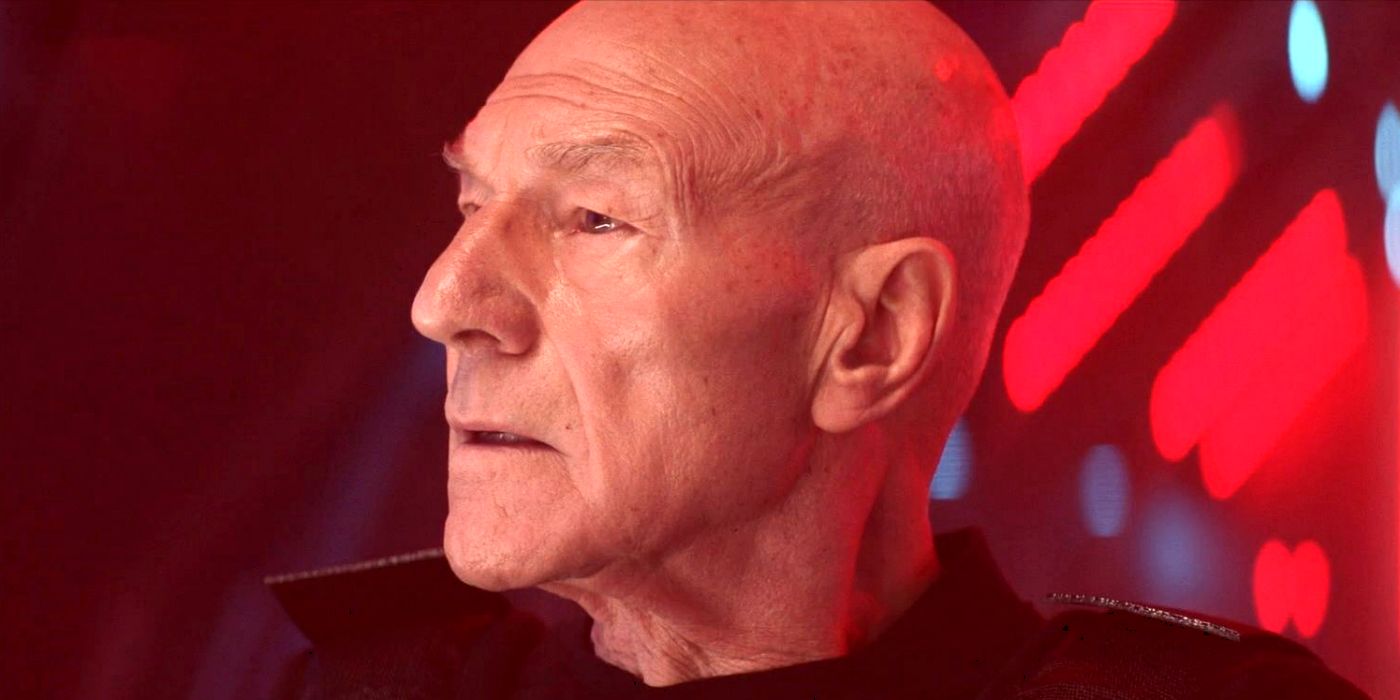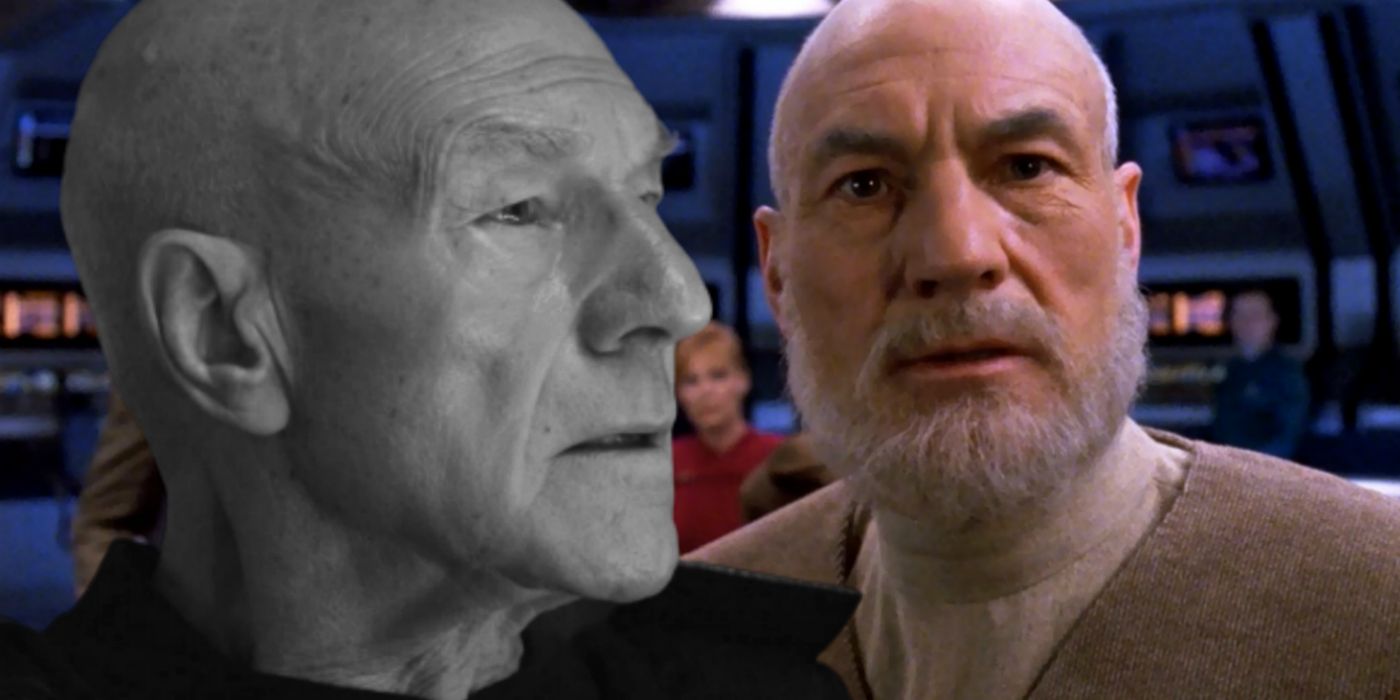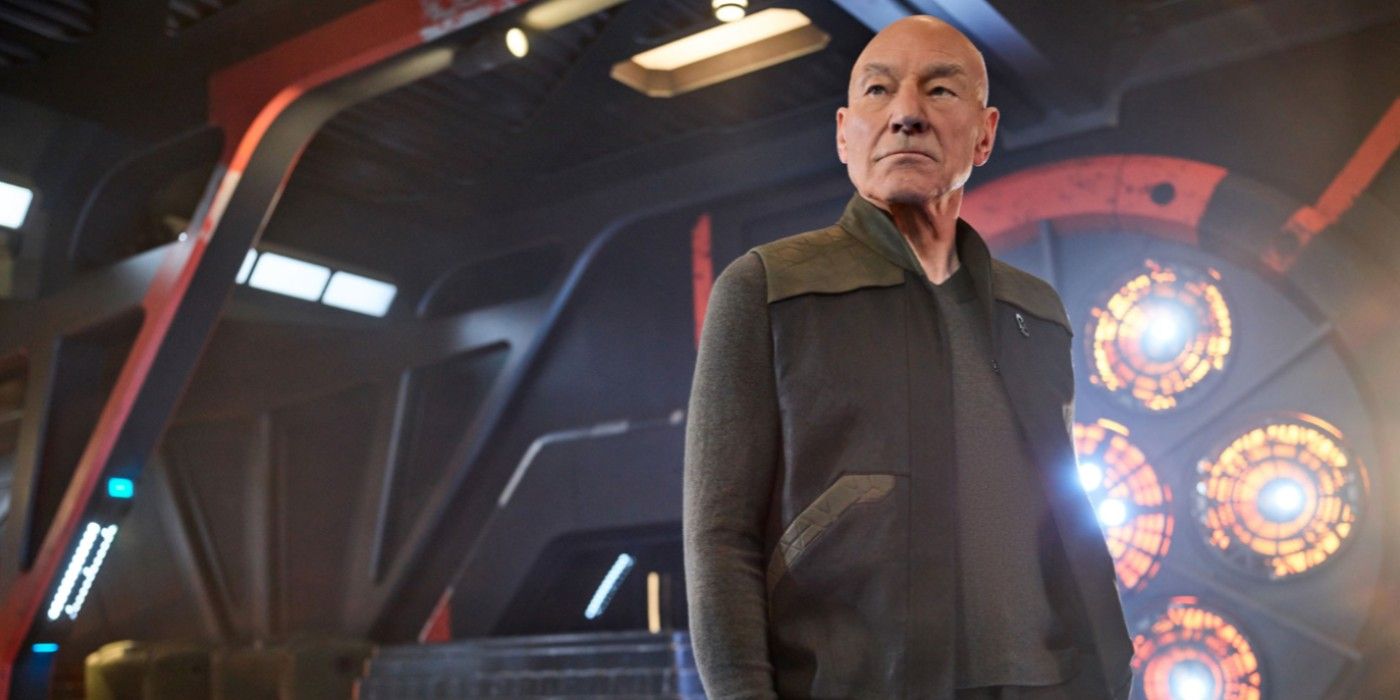This article contains SPOILERS for Star Trek: Picard season 1, episode 9 "Et in Arcadia Ego, Part 1."
Star Trek: Picard just revealed to the crew of La Sirena what fans have known for a while now - Jean-Luc is dying. In Star Trek: Picard season 1, episode 9, "Et in Arcadia Ego, Part 1," La Sirena finds itself - along with the Borg cube and Narek's ship - violently pulled to the surface of Coppelius, Soji's android home world. The ship survives the trip no worse for wear, but Picard himself is out of it, his eyes closed, mumbling greetings to someone not really there.
Once Agnes treats him with an old style tricorder she realizes that something is seriously wrong with Picard. Just before embarking on their mission to warn the synths of the incoming Romulan attack, Picard matter of factly reveals his terminal diagnosis from Dr. Moritz Benayoun as seen in the show's second episode, "Maps and Legends."
The crew is stunned, but it's been clear from fairly early on Star Trek: Picard would be chronicling the final days of Jean-Luc Picard. Even if he didn't have a terminal illness, Picard is a man in his 90s, clearly in the twilight of a rich, full life. Let's take a look at the origins of Picard's illness, as well as what it means for the short term and long term for the story of Star Trek: Picard.
Picard's Illness Was Set Up In The TNG Finale
The illness itself is a callback to the much celebrated series finale of Star Trek: The Next Generation, "All Good Things." In that episode, Dr. Beverly Crusher identifies a small defect in Picard's parietal lobe, which she explains will leave him susceptible to several different degenerative illnesses. Picard found himself afflicted with one of those illnesses, Irumodic Syndrome, in a possible future Q sent Picard to. Irumodic Syndrome left Picard forgetful and prone to emotional outbursts, and caused him to experience intense hallucinations - though it's unclear how much of the latter was Q playing tricks on his mind.
It's unclear if Picard has Irumodic Syndrome in this, his actual future, but "Et in Arcadia Ego, Part 1" is a turning point for Picard's relationship with his scrappy new crew. Picard's explanation of his terminal condition lands like a bomb on Raffi, Rios, Agnes, and Soji, in disbelief that this man who had given them all purpose again could soon be taken away from them. Elnor finds out later, and takes the news perhaps hardest of all, as he still sees Picard as the closest thing he's ever had to a father.
Picard is adamant that the grim news not change the way the others treat him, but that's an impossible promise for them to keep. Raffi barely even tries, grabbing "J.L." at the earliest opportunity to tell him she loves him. Picard's awkward, slightly bewildered response that he loves her too is one of Patrick Stewart's more heartfelt moments as Picard in the series to date.
What Picard's Impending Death Means For The Future
Jean-Luc Picard may intend to eventually meet his end with quiet dignity, but at the moment he's found a dangerous opposite number in Alton Soong, the dying offspring of Data's creator, Dr. Noonian Soong. The younger Soong is also a genius cyberneticist, and with the help of Bruce Maddox he managed to surpass his father's achievements by creating a society of androids who are superior to Data in most tangible ways. Alton Soong's next goal is to cheat death itself, by transferring his own consciousness into a synthetic body - something he's hoping Agnes will help him with.
After viewing the admonition, the android Sutra - who shares a face with Soji - decides that the Romulans misinterpreted the message, that its true meaning was a sort of call to arms meant for synthetic life, not a dire warning meant for organic life. The androids vow to wipe out organic life wherever they find it - though they pretty conspicuously don't kill the handful in their midst, as they take Picard and the others prisoner, with Soong and Agnes siding with the synths.
Seeing as Star Trek: Picard has already been renewed for a second season, it seems a safe bet Jean-Luc Picard will survive both the synth's destructive vow as well as the approaching Romulan fleet, but there's no running from his illness. It seems a given that, as the show continues, Picard will begin to suffer greater symptoms. As Dr. Benayoun said, there's no treatment for what he has, and it's going to lead to emotional outbursts at best, and catatonic episodes at worst. Long held up as the intellectual paragon of the Federation, Jean-Luc may not be in control of his impressive faculties much longer.
But if Picard begins falling apart both physically and mentally, will he still continue his mission? Does he even have a mission now? Soji has been returned to her home, and while he's not wild about her choice to side with the genocidal robots, that was always Picard's mission. Yet deep down, he and we both know that was never really the mission. Picard wanted to protect Soji, certainly, but he also wanted to protect the legacy of Data. Soji may be relatively safe and back where she belongs, but if she ends up fulfilling the Romulan prophecy of 'The Destroyer," she'll be throwing away that legacy. Assuming Picard is able to save Soji and fend off an all out orangic/synthetic war, it stands to reason he'll have another adventure lined up - and that one figures to be much harder on Picard.
Perhaps more than any other Star Trek lead, Jean-Luc Picard has often grappled with his own mortality. His philosophy on the matter may be best summed in a decidedly mediocre chapter of his story - Star Trek: Generations. In it, the crazed scientist Soran - obsessed with entering a magic heaven energy ribbon called the Nexus - refers to time as a predator we can never outrun, stalking its prey until it makes the kill. Picard optimistically counters that he thinks of time as an old friend that comes along with us on the journey, and is to be cherished - because no one lives forever. In Star Trek: Picard, Jean-Luc is looking time square in the face - and it's not yet clear if he sees a predator or an old friend.




